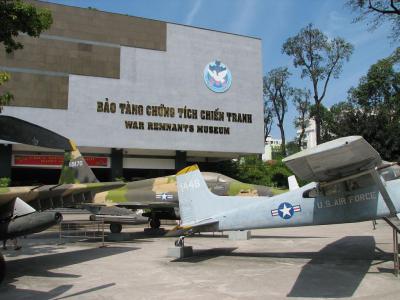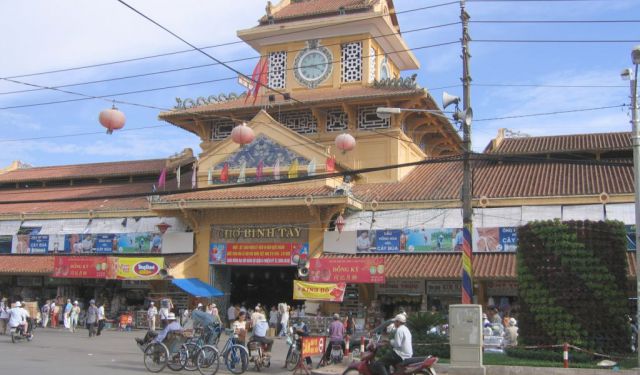War Remnants Museum, Saigon/HoChiMinh City (must see)
The War Remnants Museum is one of Ho Chi Minh City’s most visited sites, offering a sobering look at the Vietnam War – known in Vietnam as the American War – from a local perspective. It is not a lighthearted stop, but rather a deeply thought-provoking experience that leaves a lasting impression on most visitors.
The museum is arranged across several themed galleries and an outdoor courtyard. On the grounds stand original military vehicles and equipment such as tanks, artillery, helicopters, and fighter jets, as well as large ordnance once used during the conflict. Inside, the galleries house exhibits that document the war through photography, artifacts, and detailed narratives.
Among the most powerful displays are those dedicated to the consequences of chemical warfare, particularly the use of Agent Orange, with striking images and personal stories illustrating its devastating long-term effects. Another section focuses on the treatment of prisoners, including reconstructions of the so-called “tiger cages” where detainees were once confined. Visitors will also find exhibits about major wartime events, including atrocities that shaped global awareness of the conflict.
While much of the material is harrowing, the museum also highlights the work of international war correspondents and photojournalists, whose striking images helped bring the realities of the war to audiences worldwide. The inclusion of historical artifacts such as a French guillotine further broadens the scope of the museum, reminding visitors that Vietnam’s struggles for independence extended beyond the American War.
The War Remnants Museum provides one of the most comprehensive and impactful accounts of modern Vietnamese history. It is an essential stop for anyone wishing to understand the human cost of war and the resilience of the Vietnamese people.
Tip: Starting from the upper floors and working your way down helps the exhibits flow more coherently.
The museum is arranged across several themed galleries and an outdoor courtyard. On the grounds stand original military vehicles and equipment such as tanks, artillery, helicopters, and fighter jets, as well as large ordnance once used during the conflict. Inside, the galleries house exhibits that document the war through photography, artifacts, and detailed narratives.
Among the most powerful displays are those dedicated to the consequences of chemical warfare, particularly the use of Agent Orange, with striking images and personal stories illustrating its devastating long-term effects. Another section focuses on the treatment of prisoners, including reconstructions of the so-called “tiger cages” where detainees were once confined. Visitors will also find exhibits about major wartime events, including atrocities that shaped global awareness of the conflict.
While much of the material is harrowing, the museum also highlights the work of international war correspondents and photojournalists, whose striking images helped bring the realities of the war to audiences worldwide. The inclusion of historical artifacts such as a French guillotine further broadens the scope of the museum, reminding visitors that Vietnam’s struggles for independence extended beyond the American War.
The War Remnants Museum provides one of the most comprehensive and impactful accounts of modern Vietnamese history. It is an essential stop for anyone wishing to understand the human cost of war and the resilience of the Vietnamese people.
Tip: Starting from the upper floors and working your way down helps the exhibits flow more coherently.
Want to visit this sight? Check out these Self-Guided Walking Tours in Saigon/HoChiMinh City. Alternatively, you can download the mobile app "GPSmyCity: Walks in 1K+ Cities" from Apple App Store or Google Play Store. The app turns your mobile device to a personal tour guide and it works offline, so no data plan is needed when traveling abroad.
War Remnants Museum on Map
Sight Name: War Remnants Museum
Sight Location: Saigon/HoChiMinh City, Vietnam (See walking tours in Saigon/HoChiMinh City)
Sight Type: Museum/Gallery
Guide(s) Containing This Sight:
Sight Location: Saigon/HoChiMinh City, Vietnam (See walking tours in Saigon/HoChiMinh City)
Sight Type: Museum/Gallery
Guide(s) Containing This Sight:
Walking Tours in Saigon/HoChiMinh City, Vietnam
Create Your Own Walk in Saigon/HoChiMinh City
Creating your own self-guided walk in Saigon/HoChiMinh City is easy and fun. Choose the city attractions that you want to see and a walk route map will be created just for you. You can even set your hotel as the start point of the walk.
Saigon/HoChiMinh City Introduction Walking Tour
While many people still fondly say “Saigon,” the city officially became Ho Chi Minh City or HCMC in 1976, to honor the revolutionary leader who led North Vietnam. But call it what you will – Saigon still lives in the names, food stalls, and in locals’ hearts, especially in District 1, the area most of us think of when we say “Saigon.”
Long before colonial buildings and skyscrapers,... view more
Tour Duration: 3 Hour(s)
Travel Distance: 4.9 Km or 3 Miles
Long before colonial buildings and skyscrapers,... view more
Tour Duration: 3 Hour(s)
Travel Distance: 4.9 Km or 3 Miles
Saigon Shopping Tour
Among other accolades, Ho Chi Minh City is known as a great shopping destination. Attesting to its reputation are a plethora of street markets scattered throughout the city, selling all sorts of fresh local produce, including coffee beans, and other delights, not to mention street food and souvenirs – all at extremely competitive prices. There are also designated markets specialized in niche... view more
Tour Duration: 1 Hour(s)
Travel Distance: 3.0 Km or 1.9 Miles
Tour Duration: 1 Hour(s)
Travel Distance: 3.0 Km or 1.9 Miles
Historical Religious Sites
For centuries, Vietnamese people have practiced Confucianism and Buddhism brought over from neighboring China. Added to these Eastern teachings, in the 16th century, was Christianity – introduced to Vietnam by Western missionaries. The result of this variety of faiths has become a mixture of gorgeous Confucian and Buddhist temples and Catholic churches in Ho Chi Minh City. Some of these... view more
Tour Duration: 2 Hour(s)
Travel Distance: 5.9 Km or 3.7 Miles
Tour Duration: 2 Hour(s)
Travel Distance: 5.9 Km or 3.7 Miles
Chinatown Walking Tour
The relationship between Vietnam and China traces back over 2,000 years. Over this time, Vietnamese culture, customs, administrative system, and even the language have been heavily influenced by the great northern neighbor. So much so, in fact, that although Vietnam had its own spoken language, until the late 1800s its official written language was Chinese.
Chinatown in Ho Chi Minh City,... view more
Tour Duration: 1 Hour(s)
Travel Distance: 3.0 Km or 1.9 Miles
Chinatown in Ho Chi Minh City,... view more
Tour Duration: 1 Hour(s)
Travel Distance: 3.0 Km or 1.9 Miles







